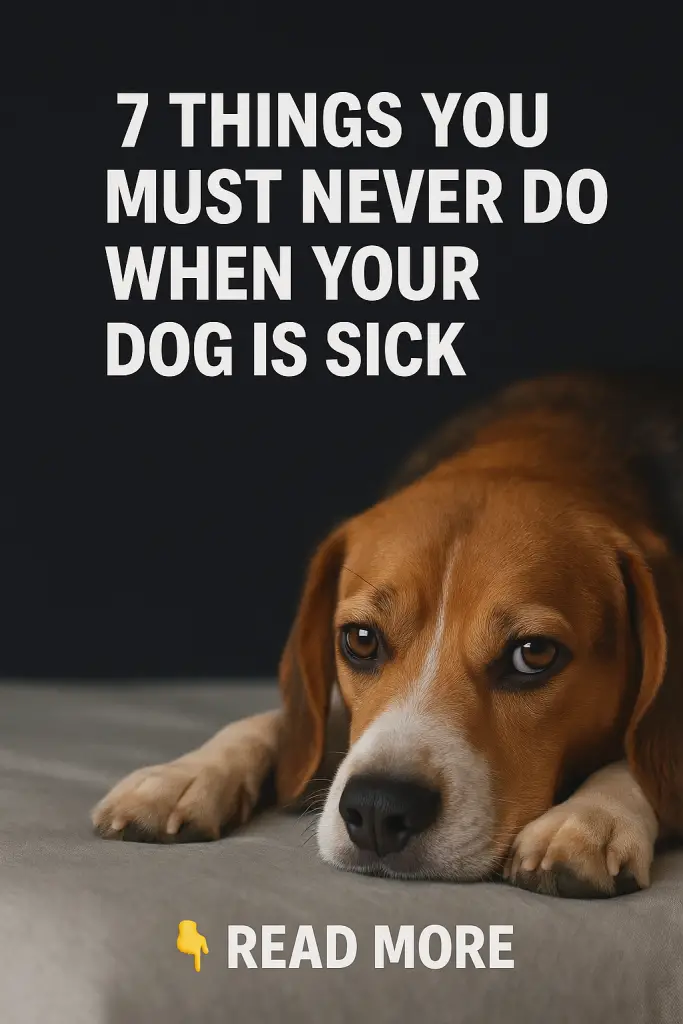
If you’ve ever seen your dog sick — even just a little off — you know that gut-wrenching feeling.
They can’t tell us what hurts, they just look at us, waiting for help. And in that moment, your actions matter more than ever.
But here’s the deal: many loving owners make innocent mistakes when their dog is unwell. Mistakes that can make things worse.
Let’s talk about what NOT to do when your dog is sick, so you can be the support system they truly need.
1. Don’t Wait Too Long to Act
“I’ll see how he is tomorrow…”
It’s a line every dog owner’s said at some point. But dogs hide pain — it’s a survival instinct. By the time they show signs, things might already be serious.
Signs you shouldn’t ignore:
- Vomiting more than once
- Sudden lethargy
- Loss of appetite for over 24 hours
- Labored breathing
💡 Rule of thumb: If it’s unusual for your dog, get it checked out.
2. Don’t Google-Diagnose Everything
We get it — the internet is right there, and vet visits aren’t cheap.
But dogs are complex, and symptoms overlap across dozens of conditions. What looks like a mild tummy issue could be something deeper.
Instead:
- Use online info only to decide if urgent care is needed
- Always double-check with your vet
- Don’t try treatments based on online advice
3. Never Give Human Medication
This one’s HUGE.
You wouldn’t believe how many human meds are toxic to dogs — even “mild” stuff like Tylenol or Ibuprofen.
| Medication | Danger to Dogs |
|---|---|
| Ibuprofen | Can cause ulcers, kidney failure |
| Acetaminophen | Liver damage, fatal in high dose |
| Aspirin (even low dose) | Risky without vet direction |
Always call your vet before giving anything — even natural remedies.
4. Don’t Force Them to Eat or Drink
Yes, dehydration is dangerous.
Yes, they need calories.
But forcing food or water into a sick dog can cause stress, choking, or vomiting.
Instead:
- Offer small amounts frequently
- Try lukewarm water or broth
- Use a syringe only if the vet says it’s safe
5. Don’t Assume It’s “Just Stress” or “Nothing Serious”
We love to explain things away. “Maybe he’s just tired. Maybe she’s moody.”
But downplaying symptoms delays help.
If something feels off, it probably is. You know your dog better than anyone.
6. Avoid Over-Coddling or Smothering
When your pup’s not well, it’s natural to want to hold them close, talk nonstop, or hover 24/7.
But too much attention can actually stress some dogs out — especially if they prefer quiet recovery.
What to do instead:
- Stay nearby but calm
- Create a peaceful, warm space
- Speak gently but give them space to rest
7. Never Skip Follow-Up Care
Once your dog seems better, it’s tempting to cancel that second vet appointment.
But a lot of conditions can relapse or need meds tapered properly.
Skipping follow-up can undo all the progress you made.
Follow-through is love. Don’t drop the ball.
❤️ Conclusion
We all want to do right by our dogs — especially when they’re hurting.
But good intentions don’t always equal good decisions.
If you’re reading this, you’re already the kind of person who wants to improve. That’s what matters.
So next time your dog isn’t feeling well, remember: stay calm, act quickly, and avoid these 7 pitfalls.
It just might save their life… or at least make their healing much smoother.
